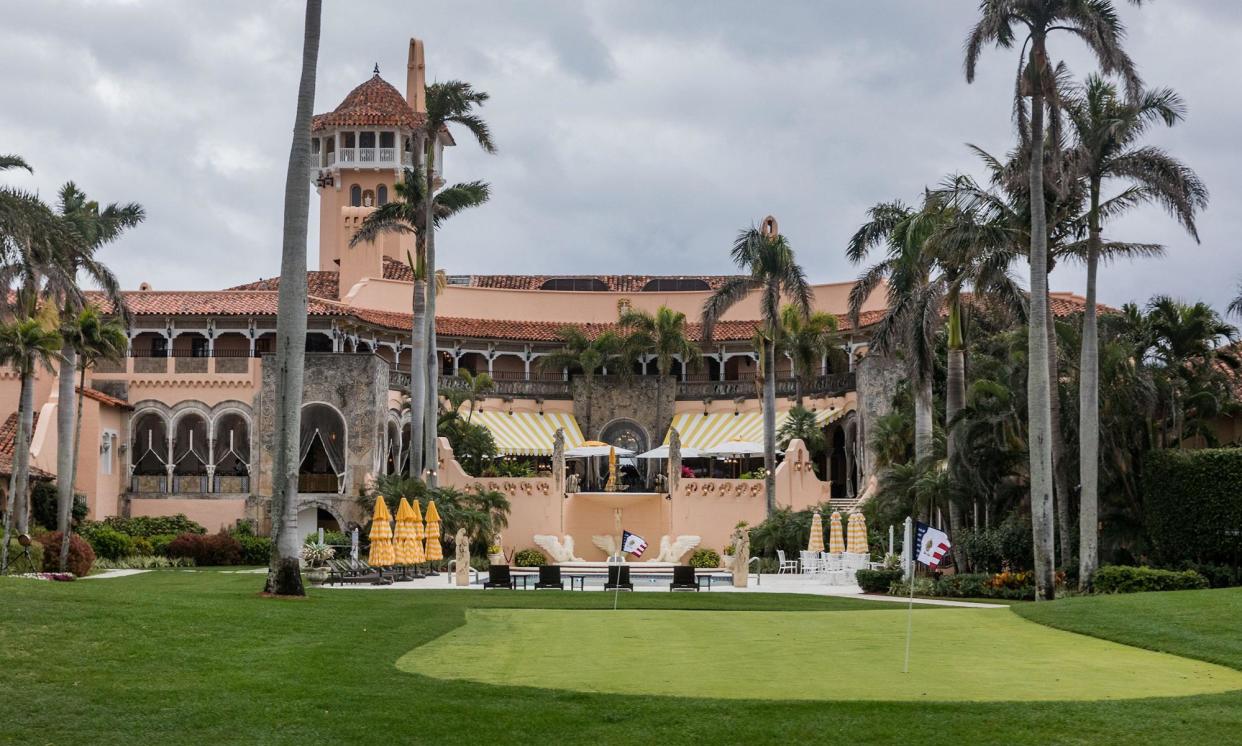Trump to ask judge to toss out lawyer notes in Mar-a-Lago documents case

Donald Trump is expected next week to ask the federal judge presiding in the criminal case over his retention of classified documents to revoke prosecutors’ access to memos made by his ex-lawyer that became key evidence of his efforts to obstruct the investigation, according to sources familiar with the plans.
The request will be made before US district judge Aileen Cannon at a sealed hearing Tuesday. The former president last month challenged prosecutors’ access to transcripts of voice memos made by ex-lawyer Evan Corcoran, but what Trump will seek behind closed doors has not been reported.
Trump’s lawyers are expected to argue that none of the memos should have been given to prosecutors on the crime-fraud exception, which allows prosecutors to see privileged communications between a defendant and a lawyer, if their legal advice was used in furtherance of a crime.
Related: Judge in Trump classified documents case reportedly refused to step aside
The sweeping request could have far-reaching consequences since the memos – with, for example, Trump asking whether they could ignore the subpoena, or a later suggestion to “pluck” out some classified documents instead of returning them to the FBI – are the strongest evidence of Trump’s obstructive intent.
Even if the judge excludes only some of the passages, it could dramatically undercut the strength of the obstruction case.
In the worst case for prosecutors, their evidence of Trump’s obstructive intent could be reduced to CCTV footage of boxes being moved at Mar-a-Lago by his co-defendants Walt Nauta and Carlos De Oliveira, logs of Trump’s calls with Nauta, and testimony about Nauta’s movements.
Trump faces a struggle to get Cannon to overturn the initial ruling by the then chief US district judge Beryl Howell in Washington DC. But Cannon has previously ruled for Trump on evidentiary disputes, most recently removing a paragraph in the indictment about Trump waving around a classified map.
A spokesperson for Trump declined to comment.
The obstruction part of the case centers on Trump’s incomplete compliance with an 11 May 2022 grand jury subpoena that demanded the return of any classified documents in his possession, months before the FBI seized 101 classified documents when it searched Mar-a-Lago.
The Corcoran memos – the contents of which were first reported by the Guardian last year – have played a major role in bolstering the charge that Trump conspired with Nauta and De Oliveira to play a “shell game” in hiding boxes of classified documents so Corcoran could not ensure their return.
According to the memos, Corcoran met with Trump on 23 May 2022, several weeks after he accepted service of the grand jury subpoena, to discuss complying with the order, including searching Mar-a-Lago and preparing a statement certifying that they had complied.
The indictment quoted the memos as saying Trump responded: “Well, what if we, what happens if we just don’t respond at all or don’t play ball with them?” and “Wouldn’t it be better if we just told them we don’t have anything here?” and “Well, look, isn’t it better if there are no documents?”
According to the memos, Trump confirmed that Corcoran would return to Mar-a-Lago the following week, on 2 June 2022, to search through boxes brought from the White House that were in the storage room, and again confirmed on 1 June 2022 that Corcoran was indeed returning the next day.
The indictment alleged that Trump, in the intervening period, directed Nauta and De Oliveira to move 64 boxes of documents to his residence from the storage room so he could go through them himself, but return only 30 boxes to the storage room, where Corcoran would do his search.
After Corcoran found 38 classified documents in the storage room, his memos recount Trump asking him: “Did you find anything? ... Is it bad? Good?” and made a sort of plucking motion, suggesting “if there’s anything really bad in there, like, pluck it out”.
Trump’s lawyers are expected to argue that the commentary in the memos, which prosecutors are likely to use at trial to show Trump’s obstructive state of mind, do not fall under the crime-fraud exception to attorney-client privilege and Howell erred in her decision to turn them over.
Trump’s lawyers will argue that Howell was overly broad in determining that more than 60 pages of transcripts fell under the crime-fraud exception, and that the instances of Trump asking whether he needed to comply with the subpoena are questions that every defendant asks to understand the full scope of their obligations, the sources said.
Trump’s lawyers are also expected to argue that none of the commentary – about Trump asking whether they needed to comply with the subpoena, or the plucking motion – satisfied the crime-fraud exception because it did not amount to Trump using Corcoran’s legal advice for a crime, the sources said.
The original thinking on Trump’s legal team was to concede that some of the memos could conceivably be subject to the crime-fraud exception, such as when Corcoran told Trump he would be searching the storage room, and Corcoran’s confirmation about when he intended to return to Mar-a-Lago.
Trump’s lawyers have since rejected that approach, reasoning that any concession could give the judge an off-ramp to wholly deny their request, whereas asking for all the memos to be struck would be a stronger argument and lead the judge to strike even some of the memos.

 Yahoo News
Yahoo News 
